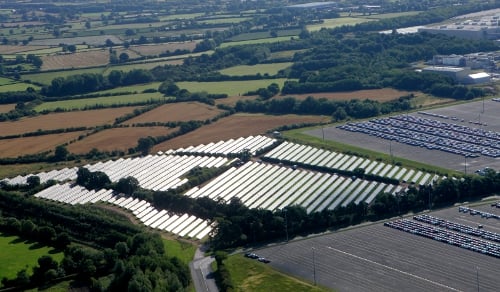
Bluefield Solar Income Fund’s (BSIF) Net Asset Value (NAV) per share decreased by just under 3% to 135.95pps on 31 December 2023 as the company navigated restricting capital market conditions.
According to the company’s interim financial results for the six months ended 31 December 2023, the decrease in NAV from 30 June 2023 was in part due to the company’s ability to convert its low-carbon pipeline to electricity-generating assets being “significantly restricted by current conditions in the capital markets” hindering its ability to raise additional equity.
This constraint was exacerbated during the first three months of the reporting period when BSIF’s 50MW West Raynham solar asset was unavailable.
As of 31 December 2023, BSIF’s pipeline consists of 137MW of solar projects and 90MW of battery storage projects with planning consent and a wider pipeline of approximately 968MW of solar and 563MW of battery storage.
In response to the Capital Market “constraint”, BSIF signed a Memorandum of Understanding (MoU) with investment firm GLIL Infrastructure (GLIL) in December 2023. The partnership consists of three phases:
Phase one: Jointly acquiring a 247MW UK solar portfolio from Lighstource bp (which was completed in January 2024).
Phase two: Securing a provisional agreement for GLIL to acquire a 50% stake in a portfolio of over 100MW of BSIF’s existing solar assets at a price in line with the company’s existing valuation.
Phase three: If market conditions allow, both companies will jointly commit capital to a selection of BSIF’s development pipeline.
Speaking of the partnership, John Scott, chair of BSIF said: “The company is delighted to have formed a Strategic Partnership with GLIL, providing a partner with whom we can co-invest for the long term, spreading our capital resources over a greater range of investors.”
BSIF also reported that the company’s share price discount to NAV “saw a significant widening” to as much as 25% at times. In response, the company announced a share buyback programme, to which £20 million has already been allocated.
“It has been disappointing to note the company’s share price discount to NAV widen, at times exceeding 25%,” added Scott.
“Meanwhile ample transactional evidence adds further weight to the credibility of the Company’s valuation, which is in stark contrast to the share price.”
Despite these constraints, BSIF reported that, according to its investment advisor’s strategy, it had fixed prices up to 26 months in advance, allowing the company’s revenues to grow in the second half of 2023 compared to the same period in the preceding year despite irradiation levels some 13% higher.
“I reiterate our full year guidance of dividend distributions for the financial year of not less than 8.8pps (2022/23: 8.6pps), which we expect to be covered approximately two times by earnings, net of debt amortisation and the EGL,” continued Scott.
“Based on yesterday’s closing share price, this provides shareholders with a yield of over 8.5%. The position of the company today is further enhanced by its high levels of regulated indexed revenues, complemented by high fixed power sales contracts, a large development pipeline, a defensive capital structure and a robust NAV.”
According to its interim results, BSIF has had a total return of 110.14% since IPO.

